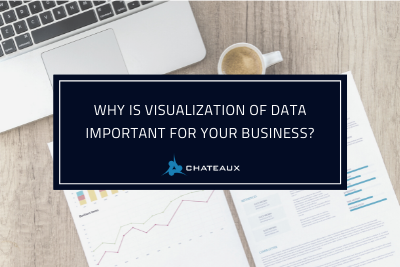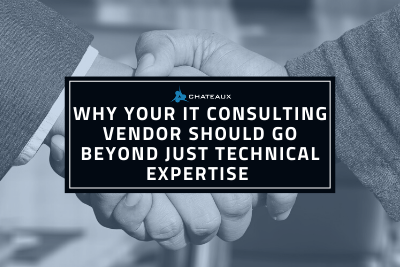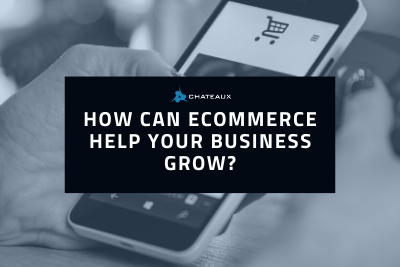Over the years, we have been privileged to appoint some of the best minds in tech to Chateaux’s Board of Advisors. Recently we virtually sat down with our newest appointee, Carter Ahl, Senior Vice President Strategic Growth, Healthcare, Ipsos, to learn about his experience leading top hospital systems through transformative growth, his predictions for the future of healthcare, and how he sees technology playing a role.
Tell me about your background….
I have about 25 years in healthcare. Most of that time has been at the hospital level working with senior executives and leaders on strategy at the intersection of people, processes, and technology, and solving key business problems at the system level. These problems relate to everything from patient experience, safety, and high reliability, leveraging technology for better patient care, how hospitals benchmark and compare to competition, how they define and improve their connection to their patients, and how to improve access in their individual markets.
So, my goal has always been to be a trusted advisor to people like CNOs, CEOs, and CMOs to help them find growth opportunities and solve their most prudent business challenges.
When advising your healthcare clients, do you find there is a commonality to the kinds of solutions required?
Now more than ever, hospitals—and this applies to biotech and life sciences—these entities look to technology more than they ever have in the past. There was always some reluctance to look at technology because it was expensive and misunderstood. Now, I think there is appetite, and really dependence, on technology to help hospitals provide better care to their patients and to be stronger healthcare organizations. Because the very root of that is data.
This is Chateaux’s wheelhouse….
Yes. The value that I see Chateaux bringing to the healthcare world is deep expertise across emerging technologies and the ability to work with data, derive insights from the data, and promote data interoperability.
I also see Chateaux as a very nimble organization. There are many large, sophisticated technology organizations out there, but speed is everything right now. Hospitals need quick help and through emerging technologies like deep data analytics, AI, machine learning, and blockchain, as well as application development. Those are all services that are in demand in the healthcare world right now. Also, a flexible model for the pricing structure is also very appealing.
You mentioned nimbleness in relation to speed, but it makes me wonder, while Chateaux has worked with healthcare and life sciences clients, we also possess experience in industries such as finance, CPG, telecom, and education—a bit of industry nimbleness!
Do you feel that broad industry experience is valuable to healthcare clients when considering IT solutions consultants?
The work that Chateaux has done outside of healthcare is exactly what is sought after right now. For instance, there are deep relationships between insurance companies and hospitals.
Thinking of the vaccine process makes me think of supply chain logistics….
Supply chain is another great example because I think healthcare is really looking for efficiencies and technology to help them solve tracking issues, so the healthcare industry is looking outside of itself for best practices.
Five years ago, if you were to walk into a hospital and say, “Hey, I’ve got great data on the performance of Apple!” the reaction would likely be that that information does not apply here. Now, healthcare organizations want those insights. They want to know what Apple is doing, what Tesla is doing, what Amazon is doing. They want those performance insights to apply to healthcare.
What do you feel is the biggest immediate need in healthcare, especially since Covid-19? What trends are you seeing?
Patients are smarter than they’ve ever been. They have access to lots of data and information, and so before they go to any healthcare facility, they’re going to do a lot of research online. You don’t even need to be research-savvy to have a lot of information at your fingertips. Patients want options for care. They want full transparency of care. And they want lots of care options. If they want to receive their care at home, they should have that option. If they want to go to a hospital and minimize human contacts through technology, they should have that option. Certain care experiences cannot be replaced by or received through technology, but I think increasing access options and the way patients receive connected care and digitization are big trends.
Are these trends just a reaction to the pandemic, or do you feel this is a long-term game changer?
I think patients’ expectations are forever different. They really are, and I think hospitals are thinking about preparedness. We’ve just been through, and are going through, an awful pandemic where people are dying everywhere. But now hospitals are smarter. They’re thinking, what happens during the next epidemic, or whatever it is? Are we going to be properly prepared? How are we going to learn from this experience and change our processes and the way we deliver care to make sure that we are ready for the next big healthcare event? And it is easy to talk about, but they just don’t know how to do it. Hospitals are not savvy in many ways; data is one area in particular. They need guidance and help.
How does the urgency of addressing critical needs and the vital role of technology in solving healthcare problems influence the way you advise your clients?
I have a propensity to want to rethink healthcare and to look at healthcare holistically. And when I say holistically, the goal is transformation in a lot of these healthcare organizations. And when I talk about transformation, it is the convergence of leadership. If we’re talking about the hospital environment, it’s the convergence of leadership between multiple C-level positions—you know COO, CEO, CHRO, CIO, CXO…. All these leaders come in together defining their mission, vision, and values at the most senior level, identifying their key business problems, identifying their key opportunities for the next one/three/five years, and then going through a true transformation to deliver on those objectives and to solve those problems. And ultimately, I think every healthcare organization wants to deliver better patient care.
To do that, I think you have to have true transformation at these organizations and technology services and solutions like Chateaux offers are a vital part of that transformation.
Thank you, Carter, for this insightful conversation!
If you are in the healthcare sector and interested in learning how Chateaux can help you achieve your goals, please reach out to us at info@chatsoft.com.


